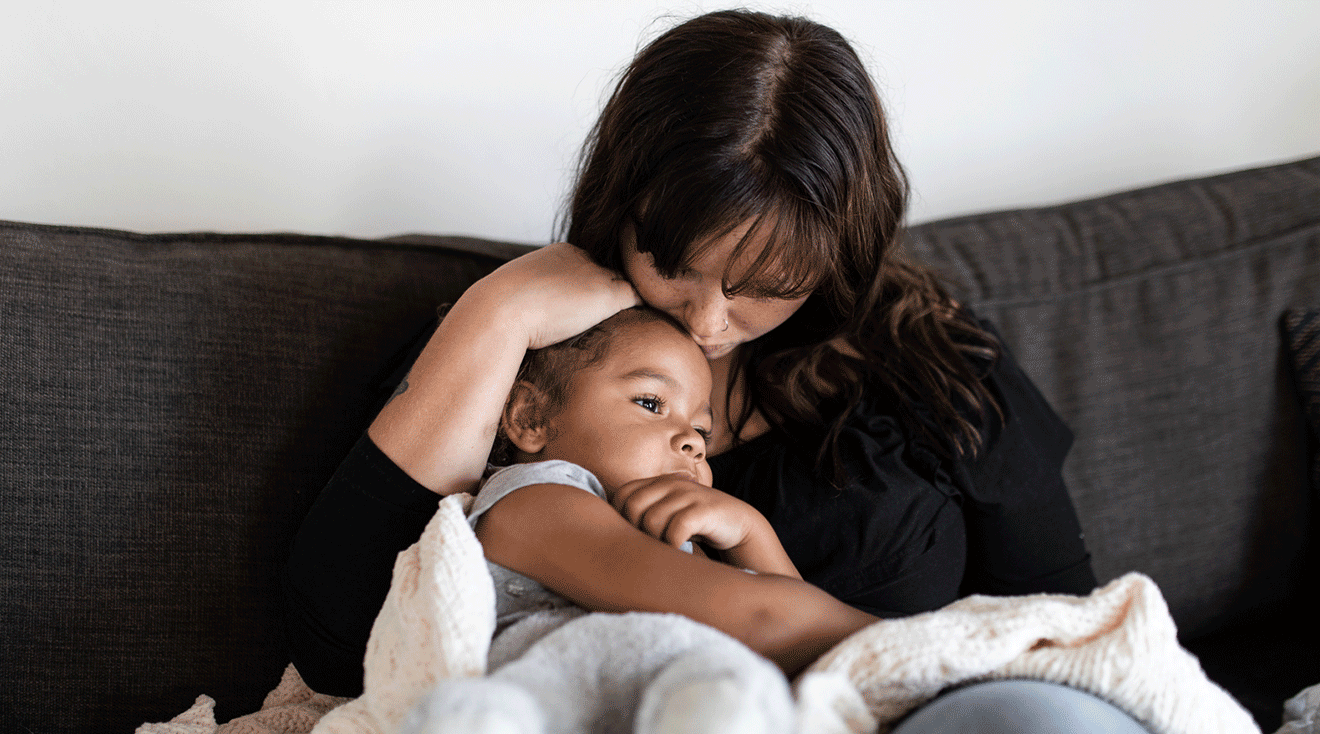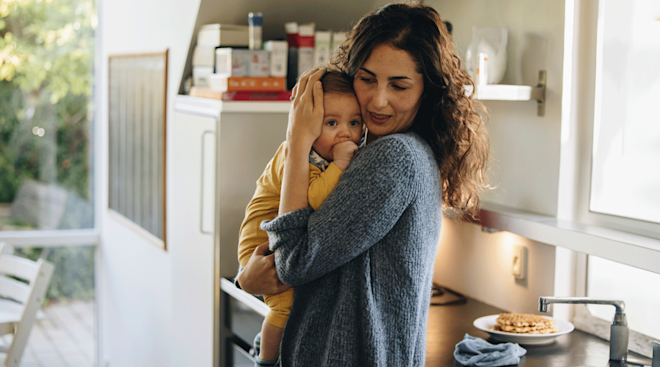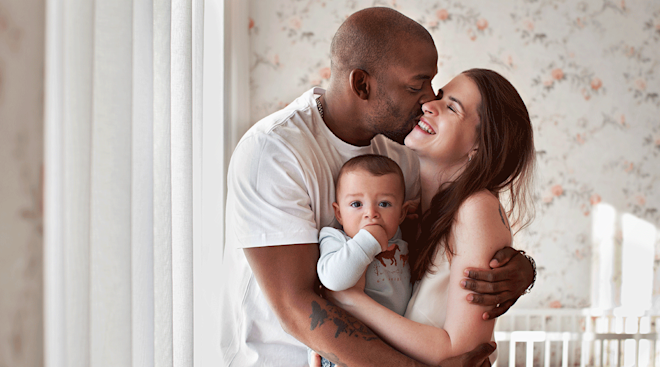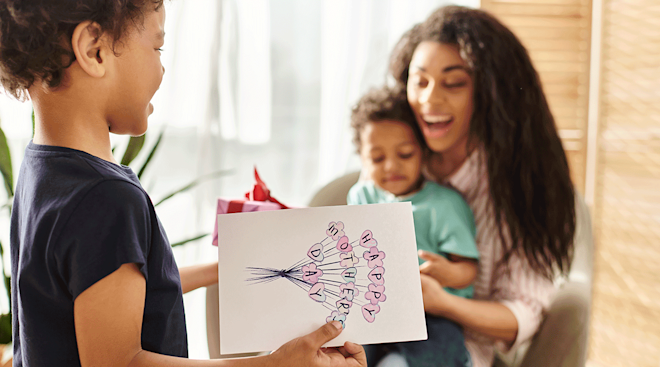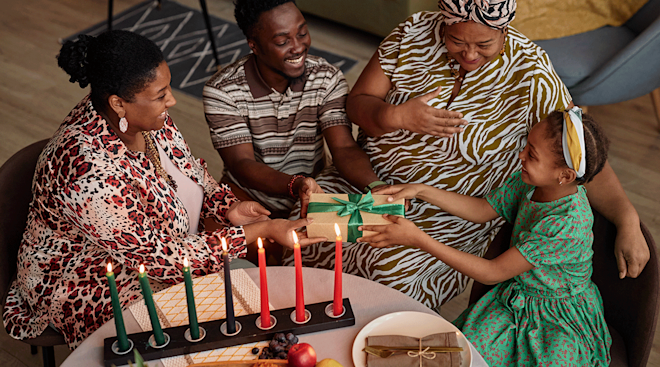How to Deal With Mom Guilt
With all the expectations society puts on us, it’s no wonder that so many women experience mom guilt—along with anxiety, rage and other issues. But what is mom guilt, exactly—and what causes the nagging voice in your head that makes you feel inadequate? Keep scrolling to learn more about the universality of mom guilt—plus, get tips and strategies from mental health experts and real parents to help you cope.
Katie Raskin, LPC, HHC, CCH, a psychotherapist and intuitive eating counselor in Atlanta, describes mom guilt as “the feelings of shame and/or frustration that come when one perceives she isn’t being a good or adequate mother.” She adds, “We internalize so many messages about what it means to be a good mom, and it’s impossible to meet every expectation—especially since many of them conflict with each other.”
Mom guilt is an inherent part of our protective wiring, explains Prianca Naik, MD, host of the Empowering Working Moms podcast. “In the era of cavemen and hunting and gathering, moms were responsible for keeping their children safe; if they didn’t, their children could die,” Naik explains. “This neural wiring keeps us wanting to spend every second with our children even when they’re safe.” And if we put our own needs first, we often feel guilty, despite the fact that it’s unwarranted.
There are all sorts of things, big and small, that can spark mom guilt, and many reasons for feeling it. For example, significant events, like returning to work after maternity leave, can provoke mom guilt, as do co-parenting struggles, work obligations or having little interest in certain kid-centric activities. All of this is entirely normal. Here are some reasons you might feel mom guilt.
Postpartum expectations
It can be incredibly daunting to learn how to raise a tiny human, and being a new parent comes with its fair share of expectations and pressure. The fourth trimester is a true roller coaster. Then there’s the added stress of breastfeeding—or choosing not to breastfeed. Valerie Hernandez, LMSW, a social worker and parenting coach, says “mothers are encouraged to pour incredible amounts of energy and worry around whether or not they can produce milk, the amount of milk they produce, choosing to formula-feed or pumping.” All of this while you’re experiencing major hormonal shifts.
Working-mom guilt
If you work outside the home, you may feel guilty about leaving your children with a caregiver and seemingly prioritizing your career over your family. Moms who stay home with their children may feel bad for wanting a break. “The work of a mother has historically been undervalued,” says Bryana Kappadakunnel, LMFT, a family therapist and CEO of Conscious Mommy. “It hasn’t been seen as the important and significant contribution to society that it is.”
Expectations of perfection
No one’s perfect, yet there are so many expectations placed on parents—specifically moms—to be the best, or to be “on” at all times. You’re told you must limit your child’s screen time, ensure they’re eating healthy and help them become emotionally secure and socially skilled. The list of weighty tasks is seemingly never-ending, and the goals are lofty to say the least; it’s easy to feel like you’re failing, if you’re not doing it all “right.” (And, spoiler alert, no one is!)
“If our expectation is that we’re never going to fail and we’re going to be these perfect parents, those [“mom fail”] moments are going to hit us harder,” says Niro Feliciano, LCSW, a psychotherapist, author of This Book Won’t Make You Happy: Eight Keys to Finding True Contentment and mom of four. “But if we start off saying, ‘You know what, I’m going to make mistakes. I’m going to learn from them, and my kids may be better for it because then maybe they’ll learn to give themselves grace when they’re parents,’" then our outlook can be more positive.
Losing your patience
Most of us lose our cool from time to time, and then we feel bad about it. Raising kids is stressful. On top of that, some of us struggle with mental health, and parenting can compound these challenges. “I’m definitely not as even as I used to be, but I feel like I can always recover from that kind of guilt, because I apologize to my kids. I own it when I’m wrong,” says Feliciano.
Not being “on” all the time
Naik says that many moms feel guilty when they don’t want to actively play with their kids, or if they get bored with the monotony of some activities. But it’s okay if you’re not keen on playing peekaboo at every waking moment. On the flip side, she says that striving to be a perfect parent can lead to overdoing, overscheduling and overstressing. It’s perfectly fine to say “no,” reminds Feliciano: “Sometimes there’s guilt in that all the kids or one child wants to do something and I can’t make it happen because I have four kids, and someone else needs me at that time,” she says. “I let myself feel bad for a moment … [but] it’s okay for them to go through some disappointment; that actually is very mentally healthy for them.”
Social media
“With so many experts—both legitimate and not—telling you how to be successful at every facet of raising children, we have more information than ever on how to ‘do it right,’” says Raskin. “When we have so many ‘shoulds’ and understandably can’t meet them all, we feel like failures.”
Lack of societal support
Here in the US, we tend to parent in a more isolated way, “unlike in the past when parenting was done more in community and/or with the support of extended family,” explains Raskin. This puts undue pressure on moms.
Stereotypical gender roles
“Moms often carry the emotional energy of the family,” says Kappadakunnel. They’re often in charge of planning and organizing the home. “When moms believe they’re not living up to the societal pressures, duties and responsibilities—that are often unreasonable and imbalanced—mom guilt arises.”
Kappadakunnel adds that moms often feel to blame when there are problems. “Not only do they feel they’ve caused the problem, but they also feel it is their sole responsibility to fix it. Most moms I know carry this burden privately—or what we call the invisible mental load.”
Suffice it to say, moms often get the brunt of this. There’s a reason it’s not commonly referred to as “dad guilt” or “parental guilt.” Naik adds that moms are often the default parent. Additionally, those who had moms who were more present and involved during their childhoods likely had their idea of parenting shaped by this model.
Mom guilt will happen—and you probably won’t be able to stop it entirely. That said, there are ways to reframe the negativity and retrain your reaction to this feeling. Here’s what the experts say.
Make yourself a priority
Take care of yourself, and show yourself grace and kindness. “Self-compassion and gentleness are two alternatives to guilt that will truly shift your perspective dramatically,” says Kappadakunnel. Prioritizing yourself can make you a better parent. “I try to remind myself that it benefits my kids to see me take time for myself,” says Raskin. “I may feel guilt when I miss bedtime to go work out or have dinner with a friend, but ultimately I’ll be better and more present for it—and they’ll see that it’s okay to prioritize their own needs. It wasn’t modeled for many of us in our own families.”
Find your people
Connect with other moms in your area through community and school resources. Attend local events in person or online. Get support and share your experiences with others who are in a similar parenting season as you.
Increase your self-awareness
Your feelings are always valid, and it’s important to be aware of them. “Guilt and fear are often intertwined,” says Renée Goff, PsyD, PMH-C, a licensed clinical psychologist and owner of Orchid Wellness & Mentoring in Cincinnati, Ohio. “When you feel guilt, stop and think about what fear is associated with that guilt. For example, ‘I feel guilty because I don’t spend enough time with my child.’ Is this a fear that your child will think you don’t love them? Once you pinpoint the fear, [determine] if it’s a realistic or irrational fear.”
Talk with your partner
Open communication is key to any successful relationship, especially those involving kids. Healthy relationships are built on compromise and teamwork. Kappadakunnel suggests discussing family responsibilities and tasks associated with each. Assign duties and commit to following through without needing reminders.
Be mindful of social media
Be intentional about your scrolling, and curate your feed with realistic displays of life as a mom. It’s okay to delete the apps too. Remember, there’s more to life than what’s online. It’s also totally acceptable to unfollow or mute accounts that portray a picture-perfect family if they have a negative effect on you. “Recognize that social media is full of curated images of moms who appear to have it all together, but that’s not reality,” says Raskin. “Sometimes a social media break is a great idea.”
Set realistic expectations
Don’t sweat the small stuff. There’s no prize for the most creative Elf on a Shelf location. “Chicken nuggets are still chicken,” says Kappadakunnel. Instead of striving for perfection, think about what’s important. Keep your children safe, fed, healthy and loved.
Don’t be afraid to be an imperfect parent
“One of the major sources of mom guilt I see, and personally experience, comes from the feeling that we need to be emotionally present for our kids at all times and never lose our temper,” says Raskin. “There’s a lot of misinformation about what’s needed for a ‘healthy attachment,’ and the reality is that having a ‘rupture’ with our child—for example, if we yelled or lost our patience—[is] okay.” She adds that children can actually benefit more from a parent who acts imperfectly, and then apologizes, than from one who never, ever loses their cool.
Get help from a professional
If you start to experience consistent negative and intrusive thoughts or guilt that keep you from doing things you typically enjoy, seek counseling. “Things don’t have to get unbearable before you can ask for help. The existence of mom guilt at all is enough,” says Hernandez.
Every mom experiences mom guilt in a different way, and we all have different ways of coping. Here are a few stories illustrating the diverse experiences of moms.
“I absolutely love my job, but it requires frequent travel. As my son, Jack, 3, has gotten older, he’s started to verbalize more and more how my travel impacts him. I remember getting home from a trip a few months ago, and for three days after returning he couldn’t even see me pick up a handbag (even just for a quick trip to the grocery store!) without having a tantrum. There’s lots of little things I do to help soften the blow of my absence, like bringing home presents, frequent FaceTimes while I’m away and the Daniel Tiger ‘Love You Loops,’ but, above all, I think it comes down to my mindset. Ultimately, I have to remind myself that I’m a better mom when I’m happier, and part of what brings me happiness and fulfillment is my work. If I reframe my career (and the travel that comes with it) as a tool to making me a better mom, then mom guilt becomes much easier to manage.” — Jenny Lewis, chief marketing officer and president at The Knot Worldwide
“My son is almost 2. I came back to work when he was 5 months old, and his dad (my boyfriend) stays with him during the day. I’ve never stopped feeling guilty about it. I honestly don’t know if it’s something that will fade with time—maybe when he’s school-aged and not directly downstairs from me while I work—but the guilt of not getting to be there with him during the day is tough! I do my best to remind myself that working is a necessity and provides him everything he needs. I spend every break and lunch hour with him. Then on the weekends, we make sure that he gets one-on-one time with just Mom, and Dad has time for himself outside of the house.” — Cassie Bell, senior client billing specialist at TKWW
“As a working mom of three kids ranging from 10 to 15 years old, I can attest that mom guilt is real! When my children were younger, I often wondered if I was doing the right thing by sending them to daycare when I went back to work. Now, my kids are older and we all have busy schedules pulling us in different directions. I worry because I know that we have limited time together all under one roof before they start leaving for college and careers. One way that I deal with this mom guilt is I proactively carve out time from our schedules to make sure that we all have enough quality time together. At the beginning of the school year, I block my work calendar months out to make sure that I can volunteer at school activities. During sports seasons, I take meetings and calls from the field during my sons’ soccer practices so I can watch them play. I make sure that I drive my daughter to her field hockey practice each week so that we have time together in the car to catch up (and bond over Taylor Swift!). We also have one night a week where we all cuddle on the couch, grab our favorite snacks and watch a movie together. I’ve found that these little moments add up quickly so that my kids feel my presence and know that I’ll always make time for them no matter what.” — Felicity Chaban, chief legal officer at TKWW
“I battled postpartum depression after my son was born. The key factor in overcoming it was finding balance. Allowing myself to exist and excel outside of my role as a mother in the ways I did pre-pregnancy. I’ve always been an athlete, and carving out 30 minutes to an hour a day to get that serotonin boost made a world of difference. I’m fortunate to have a partner that supports me in taking that time. I had to let go of the mom guilt and make time for activities that refilled my personal cup, because I knew I couldn’t show up for my family if I wasn’t showing up for myself. Moms deserve to exist, take up space and be recognized as individuals in addition to being the amazing caregivers they are.” — Marilyn, lead sales force administrator at TKWW
It’s easier said than done, but try not to feel, well, guilty about feeling mom guilt. It’s a normal part of being a parent, especially with all of the pressures to be perfect that moms experience these days. But if you find yourself overwhelmed by the guilt—or find that your feelings are too much to cope with by yourself—it’s important to reach out for help.
Please note: The Bump and the materials and information it contains are not intended to, and do not constitute, medical or other health advice or diagnosis and should not be used as such. You should always consult with a qualified physician or health professional about your specific circumstances.
Plus, more from The Bump:
Niro Feliciano, LCSW, is a psychotherapist, author, speaker and mom of four. She’s the author of This Book Won’t Make You Happy: Eight Keys to Finding True Contentment and is currently working on her second book All Is Calm-ish. She earned a Master’s of Social Work from Columbia University.
Renée Goff, PsyD, PMH-C, is a licensed clinical psychologist and owner of Orchid Wellness & Mentoring in Cincinnati, Ohio. She received her doctor of psychology from Wright State University in Dayton, Ohio.
Valerie Hernandez, LMSW, is a social worker, therapist and parenting coach.
Bryana Kappadakunnel, LMFT, is a family therapist and CEO of Conscious Mommy.
Prianca Naik, MD, is a clinical physician, professional coach and the host of the Empowering Working Moms: Real Talk with Dr. Prianca Naik podcast. She earned her medical degree from Tulane University School of Medicine.
Katie Raskin, LPC, HHC, CCH, is a psychotherapist and intuitive eating counselor in Atlanta. She treats individuals who are experiencing anxiety, chronic dieting, negative body image and perinatal mental health issues. She received her master’s degree in mental health and wellness counseling from New York University.
Learn how we ensure the accuracy of our content through our editorial and medical review process.
Navigate forward to interact with the calendar and select a date. Press the question mark key to get the keyboard shortcuts for changing dates.
































